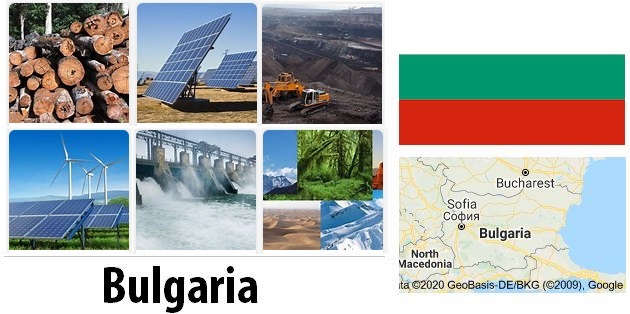Natural resources and energy
Romania has assets of several types of energy resources, including hydroelectric, coal, oil and natural gas, but in most cases the reserves are quite small. The mining industry has been declining since the fall of communism in 1989 and a number of antiquated mines have been closed down.
There are relatively good assets of copper, lead, zinc, iron ore and borax salt. A state-owned gold and silver mine at the Transsilvanian community Roşia Montană – dating back to Roman times – was closed for environmental reasons in 2006. A number of attempts have been made to start the extraction again, but in 2016 the government declared Roşia Montană with the area as a cultural monument, which was supposed to stop mining for excess. future.
- COUNTRYAAH: Major exports by Romania with a full list of the top products exported by the country. Includes trade value in U.S. dollars and the percentage for each product category.
Romania has assets of oil, natural gas and coal, mainly lignite, but the resources have been poorly utilized and modernization began only after 2000. Therefore, the country must import almost a third of the energy consumed. Some of the oil and most of the natural gas is purchased from Russia. Oil lines run to the port city of Constanţa on the Black Sea.
The hydropower is the largest in southeastern Europe and accounts for one fifth of Romania’s electricity generation. An equal share is generated in the country’s only nuclear power plant in Cernavodă, which was inaugurated in 1996. A second reactor was started in 2008 and work is underway to build two more reactors in Cernavodă. There are plans to start building a nuclear power plant in Transylvania in the 2020s.
- Abbreviationfinder: A popular acronym site in the world covering abbreviation for each country. For example, RO stands for Romania. Visit itypeusa for more information about Romania.
The rest of the electricity is extracted from coal or gas-fired thermal power plants. Investments in renewable energy such as wind and solar power have increased significantly in recent years. Romania has a surplus in electricity generation and exports some of its electricity.
FACTS – ENERGY AND ENVIRONMENT
Energy use per person
1,592 kilograms of oil equivalent (2014)
Electricity consumption per person
2584 kWh, kWh (2014)
Carbon dioxide emissions in total
70 003 thousand tonnes (2014)
Carbon dioxide emissions per inhabitant
3.5 tons (2014)
The share of energy from renewable sources
23.7 percent (2015)
2019
November
PSD changes leader after election defeat
November 27th
Following the defeat in the presidential election against Klaus Iohannis, PSD chairman Viorica Dăncilă submits his resignation application. A number of those who belonged to the party top follow her example. Marcel Ciolacu is appointed temporary party leader.
The reign of President Iohannis
November 24
Klaus Iohannis wins a superior victory in the second round of the presidential election. When 95 percent of the votes are counted, Iohannis has received 63 percent of the vote, while PSD leader and former Prime Minister Viorica Dăncilă lands at 37 percent. It is the worst outcome ever for the PSD that has dominated Romania’s politics since the fall of Communism in 1989.
President Iohannis wins the first round of the presidential election
November 10
President Klaus Iohannis goes for a clear victory in the first round of the presidential election. When the results from 90 percent of the polling stations are received, Iohannis has received 36 percent of the votes. His main challenger, former Prime Minister Viorica Dăncilă of the Social Democratic PSD, has gained 24 percent. Iohannis, who has a background in the PNL Liberal Party, and Dăncilă have long been lying on the other. In third place comes Dan Barna from the newly formed Union Union Save Romania (USR) by 13 percent. A total of 14 people voted in the election. As none of the candidates managed to reach more than 50 percent of the vote, a second crucial round of elections will be held between Iohannis and Dăncilă on October 24.
Green light for new EU Commissioner
November 6
The EU Commission’s future president Ursula von Leyen accepts the new government’s proposal for EU commissioner: Adina Vălean, EU parliamentarian and member of the ruling National Liberal Party. None of the candidates proposed by the previous government, led by the Social Democratic PSD, was approved.
Minority government approved
November 4th
Parliament votes to approve a minority government consisting of the National Liberal Party (PNL) and its leader Ludovic Orban as head of government; 240 of the 465 MEPs I vote to support the new government. The former ruling party PSD boycott the vote.
October
Contested prosecutor gets top job in EU
October 16
Announces that Laura Codruţa Kövesi will be the new head of the EU’s new Public Prosecutors Office (Eppo) to investigate suspected corruption on the EU budget; Kövesi’s candidacy faced fierce opposition from the recently deposed PSD government. Before she was appointed head of the Romanian Anti-Corruption Unit in July 2018, Kövesi had made herself known as an effective boss. Hundreds of politicians were prosecuted for corruption. However, the government said that it went too far in terms of its powers and diminished Romania’s reputation.
Liberal gets commissioned to form government
15 October
President Iohannis appoints Ludovic Orban, leader of the National Liberal Party (PLN), as new head of government after the Social Democratic PSD was forced out of power in a vote of no confidence a few days earlier.
The government is forced to step down
October 10
Viorica Dăncilă and her government are cast off by a vote of no confidence in Parliament. The motion is supported by 238 of Parliament’s 465 members. The government lost its majority in parliament in August when the smaller coalition partner Alde withdrew from the cooperation.
September
Ex-president collaborated with Securitate
September 20
A Bucharest court has ruled that former President Traian Băsescu cooperated with Securitate, the country’s feared security police during the communist era. Băsescu says he provided some information about other students during his studies, but he did not know that the person receiving the information was a person within Securitate. Băsescu states that he will appeal against the judgment, pointing out that during his time as president (2004–2014) he condemned communism, opened Securitate’s archives and made sure that all documents were handed over to the National Council tasked with reviewing Securitate’s activities, that is say the counsel that now brought the charges against him.
August
Disputed amnesty law is voted out
August 28th
The overwhelming majority of MEPs rejected a controversial bill that would have given amnesty to all prisoners sentenced to imprisonment for up to five years with the exception of those who perpetrated violence. If the proposal had gone through, it would have opened an opportunity for convicted politicians to escape prison.
Government crisis after retrenchment
August 26th
Just over two months before the presidential election, the smaller party leaves the Alde government coalition with the Social Democratic PSD. Alde’s party leader, Călin Popescu-Tăriceanu, says he no longer has the confidence of Prime Minister Viorica Dăncilă because she made a number of decisions without consulting him. With Alde’s departure, three of the party’s ministers leave their posts while a fourth chooses to remain. Dăncilă says she will now try to build a new majority in parliament or continue as leader of a minority government.
Protesters demand new government
10th August
Over twenty thousand protesters march in Bucharest demanding the resignation of the government. The demonstration takes place on the anniversary of a similar but much larger demonstration that ended in violence. Hundreds of protesters and some thirty policemen were injured (see August 2018).
July
New minister resigns following police scandal
July 30
Nicolae Moga resigns as Minister of the Interior after only a week on his post. The cause is a people storm against the police after the murder of a teenage girl. The girl managed to make three emergency calls to 112 after she was kidnapped but the police delayed initiating an operation to find her.
Renovation in the government
July 24
Prime Minister Viorica Dăncilă is giving the government some new blood by replacing the Foreign and Home Affairs Minister. Political veteran Teodor Meleșcanu, 78, is replaced as Foreign Minister by 46-year-old Ramona Mănescu, the first woman in the post. Among other things, Mele blandcanu had been criticized for his handling of the foreign votes during the EU elections, which became a major setback for the ruling PSD. Interior Minister Carmen Dan, who was held responsible for police violence against protesters at a large protest in Bucharest in August 2018, is also being replaced. New Minister of the Interior becomes Nicolae Moga.
No to shorter punishment for corruption
July 29
The Constitutional Court rejects the legislative changes adopted by Parliament in April, which halved penalties for embezzlement and misuse of powers, and partly decriminalized bribery under certain conditions (see April 24, 2019). The legislative changes were tried by the court following reports by President Iohannis and two opposition parties.
Iohannis and Dăncilă meet in presidential elections
July 9
Prime Minister Viorica Dăncilă announces presidential elections this fall. A first round will be held on November 10. If none of the candidates receives more than 50 percent of the vote, a second round will be held on November 24. At the announcement, it is clear that President Klaus Iohannis will stand for re-election. A few weeks later, Dăncilă announces that she is also a candidate.
June
Dăncilă new leader for PSD
June 29
At an extra-party party congress, Prime Minister Viorica Dăncilă is elected new party leader for the Social Democratic PSD. Dăncilă replaces Liviu Dragnea, who since June is serving a multi-year prison sentence for abuse of power. Dragnea’s falang within the party supported another candidate, banerban Nicloae, but he lost both to Dăncilă and left falangan’s candidate Liviu Pleșoianu, a sign that Dragnea’s influence over the party was weakening.
Try to trap the government fails
June 18
The government survives a vote of no confidence initiated by the opposition. The motion of no confidence is supported by 200 members. In order to topple the government, 233 votes were required. The number of MPs voting for the motion, however, is significantly more this time than in the two distrustful polls held in 2018. At that time 166 and 161 members voted for a vote.
Pact against hollowed-out corruption laws
June 13th
President Iohannis and the leaders of the largest opposition parties sign a national agreement to revise laws and decrees that affect the judiciary. The purpose is to tear up the changes that the government has implemented in recent years and which have, among other things, reduced power for prosecutors and shortened penalties for corruption crimes. The parties that sign the agreement – the National Liberal Party, the Union Save Romania, For Romania and the People’s Movement Party – undertake to implement the outcome of the referendum on May 26 and to follow the recommendations of the EU and the Council of Europe in the area of justice. The ruling Socialist PSD parties and the Alliance of Liberals and Democrats (Alde) choose to stand outside the pact.
The government reverses criticized reforms
June 4th
Prime Minister Viorica Dăncilă visits Brussels and confirms that the government has now changed its footing and is no longer striving to implement the judicial reforms that the EU so heavily criticized (see 22 January and 19 February). Dăncilă withdrew from the reforms already after last week’s major hardships for the ruling party PSD. The party suffered defeat both in the elections to the European Parliament and through a referendum in which the voters opposed the reforms. At the same time, party leader Liviu Dragnea was jailed, who was considered to be behind the reform package in order to save his own skin. The EU welcomes the government’s new line. The following days, Dăncilă clarifies the message, saying that “the legal issues are no longer on the government’s agenda. Instead, the government should address issues that citizens prioritize, such as health care, education and infrastructure. ”
May
The leader of the ruling party imprisoned
May 27th
Liviu Dragnea, leader of the ruling Social Democratic Party (PSD) is jailed after the Supreme Court rejected his appeal. In June 2018, Dragnea was sentenced to prison for abuse of power because he arranged a pretend job at a state institution for two women who actually worked for the party. Prime Minister Viorica Dăncilă will take over the post of party leader until a post-election trustee for Dragnea can be appointed.
Strongly no to the government’s legal reforms
May 26
The government is facing a new setback in the referendum held in parallel with the election to the European Parliament. The vote is an attempt by President Iohannis to stop the judicial reforms the government is pushing through. Iohannis and other critics argue that the reforms weaken the justice system and make the fight against corruption more difficult. Just over 80 percent of those voting say no to amnesty or pardon for corruption, as well as the use of so-called emergency decrees to change the justice system. On several occasions, the government has announced emergency decrees to push through the reforms. (Iohannis has the power to impose common laws but not emergency decrees.) More than 41 percent of voters participate in the referendum, which is well above the 30 percent threshold that is considered valid for the vote.
Setback for the government in the EU elections
May 26
The ruling Social Democratic Party (PSD) suffers a major defeat in the elections to the European Parliament. The party backs more than 13 percentage points compared to the 2014 election and lands at just over 23 percent. The loss means that PSD loses 8 seats and has to settle for just as many. Together, EU-friendly opposition parties receive just under 45 percent of the vote. It is best for the National Liberal Party (PNL), which will be the largest party with just over 26 percent of the vote, thereby increasing from 6 to 10 seats. The Alliance 2020 Coalition, which consists of the Union Save Romania (USR) and the Party for Freedom, Unity and Solidarity (PLUS), receives just over 21 percent of the vote, giving 8 seats. Long thereafter, the Party For Romania comes with just over 6 percent and 2 seats. The People’s Movement Party (PMP), which wins just under 6 percent, also gets 2 seats. The last two mandates go to the Hungarian Democratic Union (UDMR), which wins just over 5 percent of the vote. (Read more about the parties inPolitical system.) The turnout is 49 percent.
The EU threatens sanctions
May 10
The EU warns Romania that the country may face sanctions if the government continues to push through the judicial reforms that the EU considers threaten the independence of the judiciary (see, for example, February 19 and January 22). In a letter to the Romanian authorities, the Vice-President of the European Commission, Frans Timmermans, notes that the EU’s objections have so far sounded unheard. If there is no change soon, Timmermans threatens that the EU will activate the penal system applied to disobedient member states. Romania can then be fined and, by extension, lose its voting rights in the EU.
April
Shorter punishment for corruption
April 24
Under pressure from the government, Parliament adopts legislative proposals that halve the penalty period for embezzlement and abuse of power, and partly decriminalize bribery if the perpetrator declares himself within one year, provided that prosecutors have not initiated any investigation. Critics believe the proposal was made to favor the ruling party PSD leader Liviu Dragnea who was sentenced for abuse of power in the summer of 2018 and who has appealed against the verdict.
The government dismisses the Minister of Justice
April 18
The dominant ruling party PSD will fire Justice Minister Tudorel Toader. Toader is accused of dragging his feet on the government’s attempts to implement reforms to change the justice system. Among other things, the government wants short sentences for certain corruption crimes and makes it easier to appeal such judgments. Toader will be succeeded on June 10 by Ana Birchall, lawyer and Deputy Prime Minister.
March
The deposed anti-corruption chief is silenced and freed
March 28
The relatively newly established unit that investigates suspected crimes committed by judges and prosecutors orders Laura Codruţa Kövesi to be placed under special legal control. Kövesi was appointed summer 2018 as head of the country’s corruption agency DNA. Kövesi is accused of misconduct in the service, for taking bribes and for falsely testifying. She is prohibited from commenting on media and is subject to travel bans. Kövesi believes that the government is running a campaign to discredit her for the appointment of a top job in the EU to which she is a hot candidate. Kövesi immediately appeals against the decision on special control. A few days later, on April 3, the Supreme Court cancels the travel ban and in June she is completely freed from the control measures. During his years at the Romanian Anti-Corruption Unit, Kövesi became known as an effective boss and hundreds of politicians were prosecuted for corruption crimes. However, the government believes that it went too far in relation to its powers and that it has diminished Romania’s reputation abroad.
February
Legal process begins against critical EU commissioners
February 21st
The luju.ro website, which is close to the government, accuses EU commissioners Frans Timmermans and Věra Jourová of abusing power and disseminating false information about Romania in the framework of the monitoring program (CVM) applied by Romania to, inter alia, ensuring that the country’s legal system is developed. to the right direction. Romania has recently faced heavy criticism from the EU because of the legal reforms implemented by the government. For example, the EU believes that the reforms are reducing the opportunities to fight corruption. A body set up by the government to investigate suspected abuses committed by the country’s prosecutors has been tasked with investigating the crimes for which Timmermans and Jourová are charged. A spokesman condemns Romania’s action and points out that the commissioners cannot be judged by Romanian courts. In 2018, Liviu Dragnea sued,
Major protests when the prosecutor is deprived of powers
February 19
The government issues a so-called emergency decree that changes the rules for appointment of judges and cuts the powers of the prosecutor. The decree deprives state prosecutor Augustin Lazăr of responsibility for the body that investigates the charges against the appointed anti-corruption chief Laura Codruţa Kövesi. Lazăr, who is on Kövesi’s side in the power struggle with the government (see February 14) can no longer stop the investigation. The decree triggers protests among the country’s judges and prosecutors who say it threatens the judiciary independently. Other citizens also go out and protest in the capital Bucharest and ten other cities. Faced with the threat of a comprehensive strike among the country’s prosecutors, Justice Minister Tudorel Toader promises to revoke parts of the decree.
The government is increasing the pressure on deposed prosecutors
February 14th
The appointed head of the country’s anti-corruption unit Laura Codruţa Kövesi (see July 2018)) states that she was called for questioning before a new body set up by the government to investigate suspected abuses committed by the country’s prosecutors. Kövesi is accused, among other things, of corruption and abuse of power. On the same day, the magazines publish a letter that Justice Minister Tudorel Toader sent to his colleagues in the EU. In the letter, Tudorel accuses Kövesi of having, during his time as head of DNA, made a secret pact with the country’s intelligence services. According to Tudorel, queuing and intelligence services must have acted as a “parallel state” in violation of the Constitution when they investigated matters relating to national security or corruption. Kövesi dismisses the allegations, claiming that they merely aim to throw her away before the appointment of the managerial post to a new public prosecutor’s office in the EU. Kövesi is one of the hottest candidates for the job.
January
Defection weakens the ruling party
30th of January
A former head of government, Mihai Tudose, announces that he is leaving the PSD as the party leader “Dragnea has kidnapped the party for its own political ambitions”. Tudose joins the Social Liberal Party For Romania which was formed in 2018 by another former head of government, Victor Ponta. With his resignation, Tudose joins a number of MPs from the PSD who have chosen to move to For Romania.
Corruption judgments may be re-examined
January 22
The government issues a so-called emergency decree that allows people convicted of corruption to have their judgments tried. The Government considers that the panel of the Supreme Court that issued the judgments was not properly appointed. The decree concerns judgments as of 2014. Thus, 350 judgments may be called into question, including the judgments against the party’s PSD leader Liviu Dragnea (see June 21, 2018).
The new head of the anti-corruption bureau will step down
January 8
Anca Jurma, who is temporarily leading the national anti-corruption unit DNA, announces her departure and points out that she cannot do her job because of “a hostile environment”. Jurma has been leading DNA since Laura Codruţa Kövesi was appointed chief in July 2018 following a long battle between the government and President Iohannis. The government considered that Kövesi blacked out the country’s reputation through numerous charges against high-ranking Romanians while President Iohannis defended her. The government has since tried to appoint Adina Florea as new director of DNA, but the proposal has not been approved by Iohannis.
Romania takes the leader jersey in the EU
January 1st
Romania takes over after Austria as President of the EU Council of Ministers for six months to come. Thus, Romania will lead the EU during a turbulent time when Britain is scheduled to leave the EU. A few days before Romania takes office, EU Commission President Jean-Claude Juncker has expressed doubts in a newspaper interview about whether Romania is ready for the task. During the year, the Romanian government and the EU have been on a collision course regarding the government’s attempt to reform the country’s judiciary (see June 2018). In an interview, Juncker says that Romania is technically well prepared for the presidency but that the country has not understood what it takes to lead the EU member states. “To be president of the EU requires that you are willing to listen to others and put their own opinions in second place. I have doubts about this,” Juncker told the German newspaper Die Welt.











